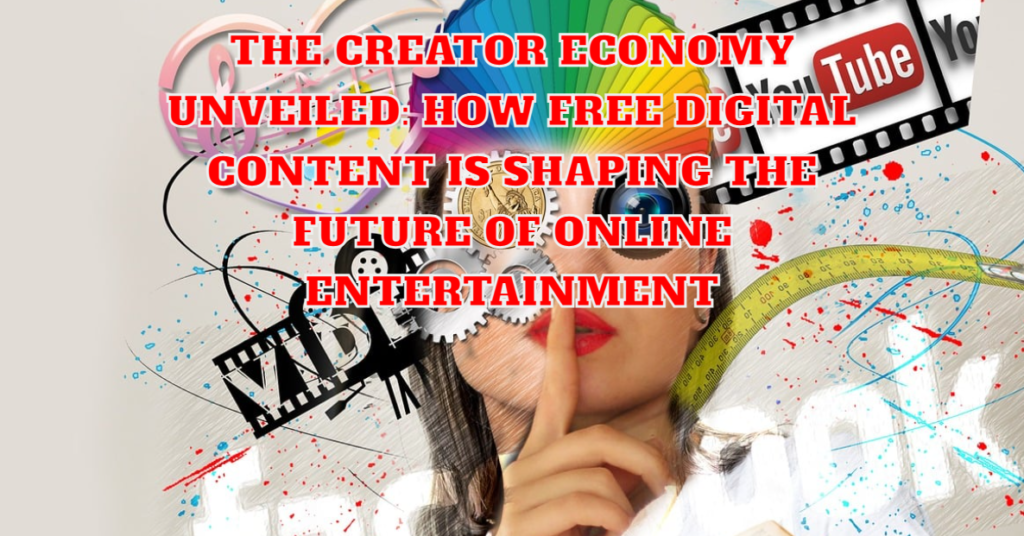The digital era has ushered in a transformative wave in the realm of online entertainment, profoundly altering how content is created, distributed, and consumed.
Central to this transformation is the creator economy, a burgeoning ecosystem that leverages free digital content as its cornerstone. This article delves into the mechanics of the creator economy, exploring its impact on traditional media, the opportunities it presents, and the challenges it faces, thereby shaping the future of online entertainment.

Emergence of the Creator Economy
The creator economy, which gained traction in the early 21st century, refers to a system where individuals can create, share, and monetize content online, effectively turning their passions into professions. This paradigm shift was facilitated by the advent of platforms like YouTube, Instagram, and Twitch, which democratized content creation by removing the traditional barriers to entry.
- Accessibility and Democratization: These platforms have enabled creators to reach global audiences without the need for traditional media’s gatekeeping mechanisms. This has led to content diversification, allowing niche interests and underrepresented voices to flourish. The direct connection between creators and audiences fosters a sense of community and loyalty, which is crucial for sustaining the creator economy.
- Monetization Models: Various monetization avenues such as advertising revenue shares, sponsorships, crowdfunding (via platforms like Patreon), and merchandise sales have become the lifeblood of the creator economy. This ecosystem provides creators with financial independence and challenges the traditional media’s revenue models, pushing them toward innovation.
Impact on Traditional Media
The rise of the creator economy has exerted considerable pressure on traditional media entities to adapt or face obsolescence. Traditional broadcasters and publishers increasingly incorporate digital-first strategies, acknowledging the shift in consumer preferences towards online content that offers authenticity and engagement.
- Adaptation Strategies: Many traditional media outlets have ventured into digital platforms by partnering with established creators or developing their digital channels. This strategic pivot aims to capture the younger demographics, predominantly consuming content online, and integrate interactive elements that enhance viewer engagement.
- Content Evolution: The creator economy has also influenced the type of content traditional media produces. There’s a notable shift towards more relatable, unfiltered content, mirroring the authenticity that makes creator-driven content appealing. This evolution reflects an understanding that the value of content no longer solely resides in production quality but in its ability to resonate with and engage the audience.
Opportunities and Innovations
The creator economy is not just reshaping existing media landscapes; it’s also paving the way for new opportunities and innovations. These developments promise to expand the scope of what’s possible within the realm of online entertainment.
- Extended Reality (XR) and Interactive Content: The integration of technologies such as virtual reality (VR) and augmented reality (AR) offers creators novel ways to engage with their audience. These technologies expand the canvas for creative expression, from immersive storytelling to interactive live events.
- national and Skill-based Content: There’s a growing trend of utilizing the creator economy for educational purposes. Platforms like Skillshare and MasterClass leverage the appeal of creator-led content to offer skill-based learning. This diversifies the content landscape and highlights the potential for meaningful, impactful content beyond entertainment.
Monetization in the Creator Economy
As the creator economy has matured, so have the strategies for monetization, enabling creators to turn their passions into professions. While ad revenue and sponsored content remain staples, innovative platforms offer new avenues for financial sustainability.
Platforms like Patreon and the best free OnlyFans accounts demonstrate the shift towards direct support models. Creators can offer exclusive content or perks to subscribers, establishing a revenue stream that rewards creativity and community engagement. Mentioning “best free OnlyFans” here highlights how some platforms allow creators to start without upfront costs, broadening access to the creator economy.
Challenges Ahead
Despite its promising trajectory, the creator economy faces several challenges that could hinder its growth and sustainability.
- Platform Dependency: Creators often rely heavily on platform algorithms for visibility, making them vulnerable to changes that can dramatically affect their reach and income. This underscores the need for diversification in distribution and monetization strategies.
- Content Saturation: As more individuals enter the creator economy, standing out becomes increasingly difficult. This saturation risks diluting the quality of content and making discovery a significant challenge for both creators and audiences.
- Sustainability Concerns: The financial sustainability of a creator-driven career is precarious for many, with a significant disparity between the top earners and the vast majority struggling to make a living. Addressing this gap requires innovative monetization models and better support structures for creators.
Conclusion
The creator economy represents a seismic shift in the landscape of online entertainment, driven by the democratization of content creation and the direct engagement between creators and their audiences. While it presents significant challenges, the opportunities it offers for innovation, community-building, and personal expression are unparalleled.
As this economy continues to evolve, its impact on traditional media, the diversity of content, and the very nature of how we perceive entertainment will only deepen, heralding a new era of digital culture where everyone has the potential to be both creator and consumer.